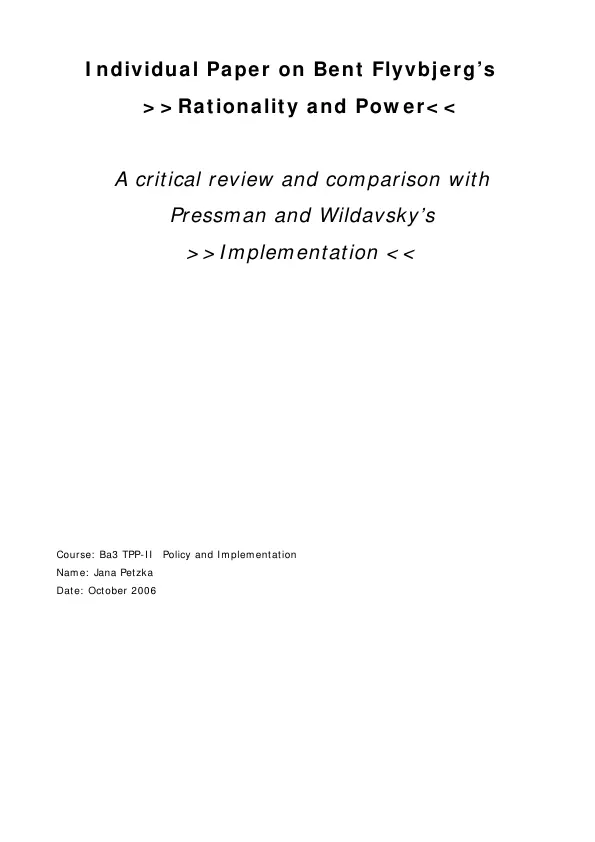This review is on a book on planning with the background not in social sciences but in urban planning and geosciences, it therefore is categorized as a major contribution to planning theory rather than to political theory(see Peattie 2001:252). But sure enough, it would not be object of this analysis if its relevance and tenor were not relevant for policy practitioners. And not only them, since the various contents are also of interest to students and academic personnel of administration and politics, anthropology and sociology and constitute furthermore a meaningful laboratory-like supplement to political philosophy courses. The book itself creates new possibilities for an inspired dialogue between researchers and practitioners.
Flyvbjerg sets out to show how power creates its own reality, uses rationality to rationalize its decisions, and strategically switches between political and expert discourses as it needs to in order to get what it wants using the Aalborg Project as a metaphor of comprehensive planning.
This scientific book review will not only evolve around the pure contents, sense making and theoretical conceptualization of Flyvbjerg’s Rationality and Power, but will include to implicate input and attempt a comparison with Pressman & Wildavsky’s Implementation and writings by Buchanan & Boddy as well as Siebers.
Inhaltsverzeichnis (Table of Contents)
- Introduction
- The Empirical Case
- Mode of Presentation
- Conceptualization of Processes
- Flyvbjerg's Conceptual Model and Sense Making
- Flyvbjerg's 'Implementation Theory'
- Conceptual Comparison to Pressman and Wildavsky's Implementation
- Conceptual Comparison to Siebers' input on Events and Interactions
- Conceptual Comparison to Buchanan and Boddy's input on the Expertise of the Change Agent
- Flyvbjerg's Position in terms of the Philosophy of the Social Sciences
- My own Evaluation
- Bibliography
Zielsetzung und Themenschwerpunkte (Objectives and Key Themes)
This review examines Bent Flyvbjerg's "Rationality and Power," a book that explores the complexities of planning and power dynamics. It analyzes the Aalborg Project as a case study to demonstrate how power structures influence decision-making, rationality, and the implementation of policies. The review further compares Flyvbjerg's framework with other prominent works on implementation, like Pressman and Wildavsky's "Implementation."
- The interplay of power and rationality in planning processes
- The use of rationality as a tool for legitimizing power dynamics
- The impact of power on the implementation of policies
- The role of various actors in shaping policy outcomes
- The limitations of traditional implementation models
Zusammenfassung der Kapitel (Chapter Summaries)
The first chapter introduces the Aalborg Project, a comprehensive city planning initiative launched in 1977. It outlines the key actors involved, their objectives, and the project's intended goals. The second chapter delves into the empirical details of the project's implementation, highlighting the power struggles, conflicts, and compromises that arose during the planning process. The third chapter focuses on the mode of presentation used by Flyvbjerg, comparing it to other case studies in the field of implementation. It discusses his use of narrative, data analysis, and the interweaving of empirical observations with theoretical concepts.
Schlüsselwörter (Keywords)
The primary focus of the text is on the interplay of rationality and power in planning processes. It explores the use of rationality to legitimize power dynamics and how power structures influence decision-making and implementation outcomes. Key concepts include power relations, implementation theory, case study analysis, and the Aalborg Project. The review also touches upon the philosophies of social sciences and the role of the planning profession in shaping policy decisions.
Frequently Asked Questions
What is the main thesis of Flyvbjerg's "Rationality and Power"?
Flyvbjerg argues that power defines reality and that rationality is often used strategically to rationalize decisions that have already been made based on power dynamics.
What is the "Aalborg Project"?
It is a case study of urban planning in the Danish city of Aalborg, used by Flyvbjerg as a metaphor to show the conflicts between technical rationality and political power.
How does power influence policy implementation?
Power structures can distort the original goals of a plan, as actors switch between political and expert discourses to achieve their own interests during the implementation phase.
How does Flyvbjerg compare to Pressman and Wildavsky?
While Pressman and Wildavsky focus on the technical difficulties of implementation, Flyvbjerg emphasizes the role of power relations in shaping the entire process.
What is the relevance of this work for policy practitioners?
It provides a realistic look at how planning actually works in a laboratory-like setting, helping practitioners understand the political forces that affect technical projects.
- Quote paper
- Jana Petzka (Author), 2006, Paper on Bent Flyvbjerg's "Rationality and Power", Munich, GRIN Verlag, https://www.grin.com/document/77495



